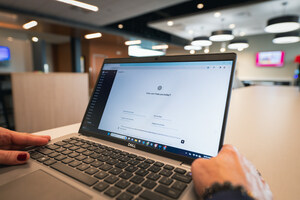Mars Scientist Philip Christensen to Receive ASU Shoemaker Memorial Award
Oct. 13 lecture: 'Unlocking the Mysteries of the Red Planet'
TEMPE, Ariz., Sept. 2, 2011 /PRNewswire/ -- Philip R. Christensen, the principal investigator for numerous instruments of Mars exploration carried on NASA spacecraft, will receive the 2011 Eugene Shoemaker Memorial Award Oct. 13 at Arizona State University.
The award, established five years ago by ASU's BEYOND Center for Fundamental Concepts in Science, is given annually to a leading scientist in honor of his or her life and work. It is named for Shoemaker, who is known for pioneering research with his wife, Carolyn, in the field of asteroid and comet impacts.
As part of the honor of receiving the award, Christensen will deliver the annual Shoemaker Memorial Lecture co-sponsored by the ASU Center for Meteorite Studies, which is celebrating its 50th anniversary this year. Christensen's talk, titled "Unlocking the Mysteries of the Red Planet," will be presented at 7:30 p.m., Oct. 13, in Neeb Hall on ASU's Tempe campus.
"Phil Christensen is the perfect example of the visionary scientist, who dreamed of exploring the cosmos in his early childhood," says Paul Davies, a theoretical physicist, cosmologist, and founding director of the BEYOND Center. "And he's no armchair dreamer. Christensen designs and builds innovative instruments and sends them into space. He has contributed ideas and hardware to nearly every NASA Mars mission since the early 1970s, and is one of the world's pre-eminent experts on the Red Planet."
Christensen is a Regents' Professor of Geological Sciences in ASU's School of Earth and Space Exploration (SESE), an academic unit in the College of Liberal Arts and Sciences. He knew Shoemaker for many years.
"Gene Shoemaker was a giant in the field of planetary science, going back even before the Apollo Moon program of the 1960s," says Christensen. "He also had a great influence on me, though not directly, as he did little work specifically involving Mars. Instead, he was a strong mentor for Sue Kieffer, a Caltech grad student of his, and she in turn became a mentor for me."
As a graduate student in the late 1970s, Christensen worked on NASA's Viking project, which sent two orbiters and two non-roving landers to Mars. He earned a doctorate in geophysics and space physics from the University of California, Los Angeles, and joined the ASU faculty in 1981.
Most of his research has involved the design and development of spaceborne infrared remote-sensing instruments. Christensen is the principal investigator for the Mars Odyssey Thermal Emission Imaging System (THEMIS) instrument, and the Thermal Emission System (TES) instrument on Mars Global Surveyor. He is a co-investigator on the Mars Exploration Rover missions (Spirit and Opportunity), responsible for building and operating the Mini-TES mineral scouting instruments.
Since the mid-1990s he has also pursued using spacecraft observations to study environmental and urban development problems on Earth.
Christensen was awarded NASA's Exceptional Scientific Achievement Medal in 2003 for his pioneering scientific observations of Mars in the infrared and won NASA's Public Service Medal in 2005. He was elected as a Fellow of the American Geophysical Union in 2004 and a Fellow of the Geological Society of America in 2009.
"Phil Christensen's research is helping to unlock the mysteries of other worlds in our solar system by means that are highly complementary to laboratory studies of meteorites," says Meenakshi Wadhwa, professor of geology in SESE and director of ASU's Center for Meteorite Studies.
"Moreover," she says, "Phil's instrument on the Mars Exploration Rovers -- Mini-TES -- helped discover the first meteorites ever found on another world. So it's highly appropriate that we're honoring him with the Shoemaker Memorial Award this year when we're also celebrating the 50th anniversary of the ASU Center for Meteorite Studies."
The center is home to the world's largest university-based meteorite collection.
The Eugene Shoemaker Memorial Lecture is free and open to the public. Seating is on a first-come, first-served basis. More at 480-965-3240 or http://beyond.asu.edu. Online maps of ASU's Tempe campus and parking structures at www.asu.edu/map.
In celebration of its 50th anniversary, the Center for Meteorite Studies will hold a symposium Oct. 21, on the topic of "Meteoritics and Cosmochemistry: Past, Present and Future." On the program for the symposium, Christensen will give a talk on how remote sensing and laboratory analyses complement each other in planetary studies.
Christensen is the fifth recipient of the ASU Eugene Shoemaker Memorial Award. Previous recipients are Steve Squyres, H. Jay Melosh, Walter Alvarez, and Harrison Hagan Schmitt.
The BEYOND Center for Fundamental Concepts in Science is a pioneering international research center established in 2006 at ASU. This "cosmic think tank" is specifically dedicated to confronting the big questions raised by advances in fundamental science, and facilitating new research initiatives that transcend traditional subject categories.
Arizona State University (www.asu.edu)
BEYOND Center for Fundamental Concepts in Science (http://beyond.asu.edu)
Center for Meteorite Studies (http://meteorites.asu.edu)
College of Liberal Arts and Sciences (http://clas.asu.edu)
School of Earth and Space Exploration (http://sese.asu.edu)
Tempe, Arizona USA
Contact:
Carol Hughes, [email protected]
480-965-6375 direct line | 480-254-3753 cell
Robert Burnham, [email protected]
480-458-8207 cell
This news release was issued on behalf of Newswise(TM). For more information, visit http://www.newswise.com.
SOURCE Arizona State University
WANT YOUR COMPANY'S NEWS FEATURED ON PRNEWSWIRE.COM?
Newsrooms &
Influencers
Digital Media
Outlets
Journalists
Opted In




Share this article